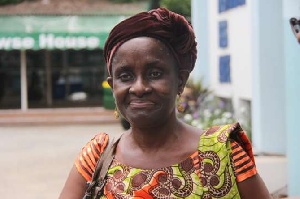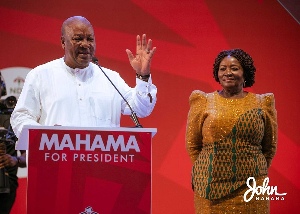An old Akan adage translates loosely as ‘even the most faraway event eventually happens’.
I can hardly believe that Ghana’s Election 2020, that December 7 national commitment, is already behind us.
However, unfortunately, its troubling ramifications, and history virtually repeating itself, look set to continue.
Notably, there have been a number of tyre-burning demonstrations by the National Democratic Congress against the presidential results announced by the Electoral Commission.
The position of their flagbearer, former President John Dramani Mahama, is that he won but has been cheated by the EC.
The results announced on December 9, by Electoral Commissioner Mrs Jean Mensa were: President Akufo-Addo – 51.303 per cent; Mr Mahama – 47. 359 per cent.
Anyhow, I recall that with past elections in Ghana, American groups were very prominent among the foreign observers invited.
However, with this year’s general election, I don’t think I heard about observers arriving from America.
Maybe the COVID-19 pandemic was a reason.
On the other hand, given what has been going on in the U.S. since their own elections on November 3, just a little over a month ahead of Ghana’s, that’s probably not surprising.
Perhaps this time U.S. electoral observation outfits didn’t feel they had the moral right to monitor another county’s elections because of how theirs turned out, the continuing incredible saga there.
In Ghanaian parlance, it has become “a concert”, difficult to understand, but an arresting phenomenon all the same, with Mr Trump as the ‘sit-tight President’ and central figure.
For the benefit of the uninitiated, ‘concert’ (or ‘dramatic concert’) in this sense, a particularly Ghanaian interpretation, describes a situation that is amusing, ironic, ridiculous, dramatic, unbelievable or bewildering – or all of the above.
However, for the record, as reported On December 10 by the BBC:
“Members of the US electoral college have affirmed Joe Biden's presidential election victory, one of the final steps required for him to take office.
“The Democrat won November's contest with 306 electoral college votes to Republican Donald Trump's 232.
“This year, due to Mr Trump's persistent efforts to question and overturn the results - involving legal challenges which have been rejected by courts across the country - the state-by-state vote was in the spotlight.”
But that is not to say that there were no U.S. observers.
Ahead of the elections, the U.S. Embassy had announced that there would be an “observer mission composed of 33 teams …. The observation teams, made up of members of the U.S. Embassy community, will travel across the country and observe the elections in 15 regions.”
Thus Ambassador Stephanie Sullivan issued on December 10 a congratulatory message to Ghana, applauding Ghana “on its successful elections” and congratulating President Nana Addo Dankwa Akufo-Addo on his re-election.
“The elections were conducted in a free, fair and peaceful manner.”
With the gazetting of the presidential results on December 10 by the EC, anybody who is challenging the results can seek redress in court, but has to file it before December 30.
And Mr Mahama himself has reportedly stated his intention to do that.
Consequently, a growing list of civil society voices, including politicians, are urging him to go to the Supreme Court.
Notably, the advice that they should take their case to the court, is familiar to the Ghanaian public because that is what the NPP did in 2012 when they said they disputed Mr Mahama’s victory.
The then presidential candidate Nana Akufo-Addo and the NPP filed an Election Petition at the Supreme Court, which took more than eight months to conclude.
Though the court ruled in favour of Mr Mahama and the NDC, many lessons emerged and the 2012 Petition is now a landmark case in Ghana’s political history.
A supreme irony is that Ghanaians are witnessing a fascinating repeat of the 2012 post-election situation.
Not surprisingly, the recordings of the taunts by the NDC then, advising the NPP not to be sore losers and to go to court, are now being replayed for the NDC.
Social media platforms are awash with, especially, 2012 recordings featuring NDC General-Secretary Mr Asiedu Nketia.
Intriguingly, the NDC have accused the EC of rigging the election in favour of Akufo-Addo and his NPP with the connivance of the military and the Ghanaian media.
Strange that the NDC have chosen to pick this quarrel with the media.
In present day Ghana, although sadly not so many people patronise newspapers, evidently most of them have radio or television; or both.
They also have smart phones with social media applications.
Secondly, Ghanaians took to heart the Supreme Court 2012 advice that “elections are won at the polling station”.
Thus polling station results were of the utmost importance to people and were being relayed by the media as and when announced at the polling stations, and usually as “provisional results”.
Why then the accusation that media houses conspired to announce results favouring the NPP?
Clearly a case of the messenger being blamed for the contents of the message!
There’s no need to kill the bearer of the news even if it is bad news!
On December 16, the EC took their transparency agenda many notches higher when they published on their website the all-important scanned ‘pink sheets’, the presidential results, including signatures of the representatives of the contesting political parties.
(ajoayeboahafari@yahoo.com)
Opinions of Monday, 21 December 2020
Columnist: Ajoa Yeboah-Afari















